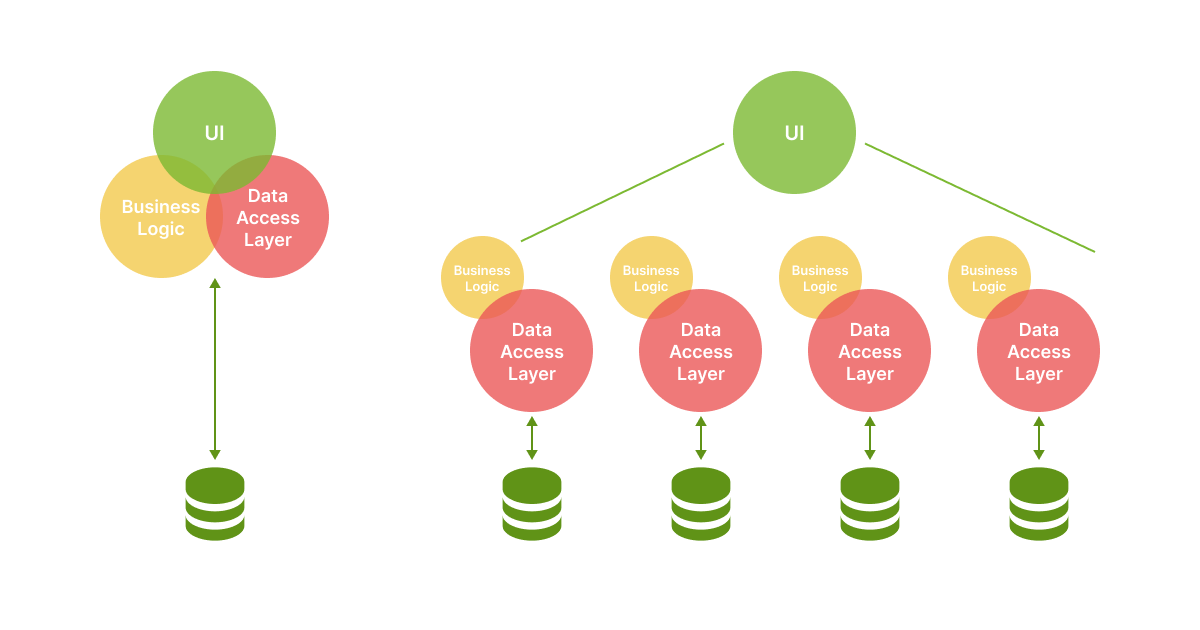Beyond the Hype: Why Monoliths Still Matter in Modern Software Development
Work on a new project starts with the solution to the question: what method of creating an application to choose — monolithic or based on microservices? If compared with the traditional monolith model, the microservice approach allows you to take full advantage of the benefits: such products are more flexible, and scalable, which is confirmed by the examples of Netflix, Google, and Amazon. The success of global giants has caused the popularity of the microservice approach. At the same time, the monolithic approach is complicated by the need to process large amounts of data and the difficulties of introducing innovations.
Is the microservice method so promising? Can it be considered a universal alternative to writing an application with a monolithic architecture? Below we will try to figure out what is best for your business — a monolith or microservices.
What is a monolith?
A monolithic application consists of one large code base, the components of external and internal code configuration files. Even though the approach is considered traditional and rather outdated, a monolithic architecture will be the best option for many companies and their products. In fact, a monolithic program is one project that works with a single database according to the logic organized from the inside.
What are the pros and cons of a monolithic architecture compared to a microservice one?
Let's start with the advantages:
- Easy development and deployment. Due to the centralization of components, a product can be quickly created and brought to market, which is doubly convenient for developers working alone or in small teams.
- Easy testing: only one code repository needs to be tracked.
- Working with a monolithic architecture gives a significant advantage — the simplicity of security.
Among the disadvantages:
- If you need to expand and complicate the application, the code base becomes more complex and voluminous, so there are difficulties with control.
- Scaling monolithic applications — vertical, which is accompanied by the addition of computing resources. Such an operation costs more, and the possibilities are limited.
- Monolithic architecture is also limited in terms of technology.
- A problem with one aspect of the application can crash the entire system.
Read also: Registration of Сopyright to Mobile Applications for iOS & Android
What is a microservice application?
What is the difference between monolithic and microservice architecture? The traditional application-building model assumes a unified organization, while the microservice approach dictates a breakdown into several small, autonomous components. Each component is responsible for executing a bit of the process independently. Accordingly, each service has its own logic and database.
The difference lies in the principle of operation of the microservice application. Its functioning is divided into several modules, the interaction of which is provided through the API. Updating and scaling of modules are performed independently of each other. A survey conducted in 2020 by O`Reilly testifies to the spread of the microservice approach.
What are the benefits of microservices?
- Autonomy of each service and the ability to deploy, and configure independently of each other;
- Simple horisontal scaling. Compared to vertical scaling of a monolithic application, horizontal scaling is less expensive and does not impose technological restrictions;
- Greater flexibility: developers can add new technologies based on microservices without burdening the architecture.
But there are also disadvantages:
- The complexity of the application;
- Need special skills of specialists to create an application;
- Vulnerability of individual components and distributed security control centers;
- Additional expenses for service maintenance.

Microservices vs. Monolithic Architecture: pros, cons, and reasons for adoption
What to rely on when ordering custom enterprise software development?
Arguments for monolithic architecture:
- The simplicity of the application where extended business logic, scalability, and flexibility are not needed;
- The need for a quick launch of the product. This is ideal when you need to quickly confirm a business model's viability or save money early.
- Minimization of delays. Fewer network connections reduce program response time;
- Possibility to build a modular monolith: this architecture consists of several segments and provides a competent organization without switching to microservices.
Why choose a microservice approach?
- You need a complex and scalable product. The microservice pattern is more adapted to adding new features and scaling;
- The ability to release new features frequently, updating an independent microservice rather than the entire product;
- Enhanced fault tolerance due to segment isolation;
- Use of several technologies in one solution without the risk of their conflict.

How to choose between monolithic applications and microservices-based applications
Factors for choosing a proper approach to creating an application:
- Complexity. For a simple solution such as a forum or a simple online store, a monolith is suitable, but it is better to test a more serious project with the help of microservices;
- Qualification of the team and its size. Without experience with microservices, creating a high-quality project from scratch will not be easy, so a monolithic application will be optimal. This is optimal for both single developers and small teams;
- Prospects for growth and expansion. Management and control over a monolithic application becomes more complicated as it scales and adds new functions — it would be more rational to choose a microservice model in this case;
- Development period and costs. Creating a monolithic product is faster and cheaper. But microservices are more expensive at the initial stage, although they save money when adding new functions.
Conclusion
Although microservices are considered to be a trend in the IT world, the choice of this approach is not always justified. Software Development Hub developer knows many examples of neighboring companies that took on a project based on a microservice, but due to the complexity of the work, they just slipped into a modular architecture. Therefore, starting work on an application on a microservice architecture is cost-effective, provided the work of a large team, the use of complex and costly technologies, the docking of different components, etc., are guaranteed. Our company recommends that customers opt for a monolithic application architecture for a natural business with a trend toward organic growth. The core development is quite fast, as well as the determining project features at the initial stage of MVP. As the load grows in the project, those bottlenecks that are advisable to transfer — first to modules and then to services — are identified.
Сustom IoT software development performed by SDH is the implementation of ideas in accordance with the needs of the audience and the business objectives of the customer. We have launched projects in digital health, education, home automation, and security industries; as for the products developed by the team, they are used by more than 9 million people worldwide.
Categories
About the author
Share
Need a project estimate?
Drop us a line, and we provide you with a qualified consultation.








